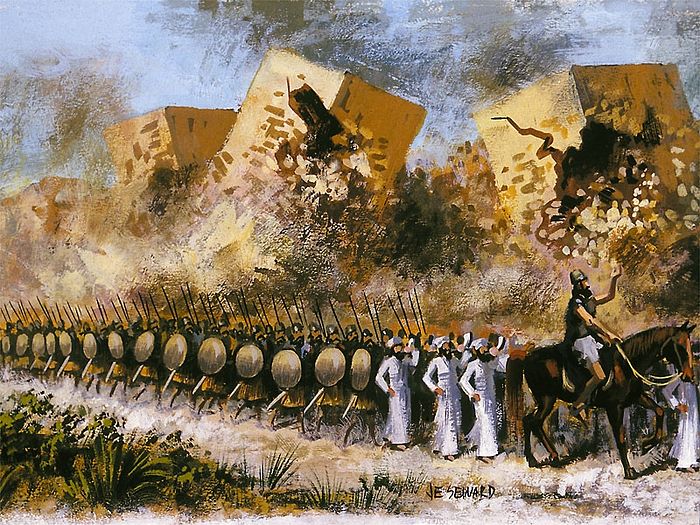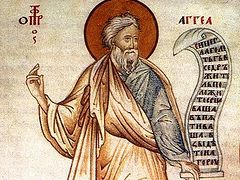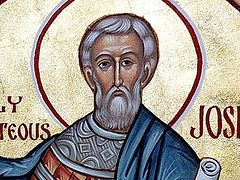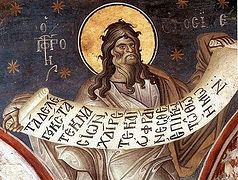When the people of God had accomplished their exodus from Egypt, the Promised Land was revealed to them. It was not a strange land, but the land of their forefathers. Abraham, Isaac, and Jacob once lived there. Famine drove their descendants from Palestine to Egypt. And so, after many years, the people returned to their own place.
It was no longer a group of families, connected by blood ties that was returning, nor a sprawling clan, but an entire people. But the Promised Land turned out to be quite inhabited. The Palestinian tribes living there were not inclined to make room and cordially receive the newly-appearing people. War was inevitable. It can’t be considered a typical takeover of neighboring territories in order to plunder someone else’s goods and enslave the natives.
Moreover, we recognize that the entrance of the people into Palestine was accomplished according to the will of God, not the will of any visionary leaders or raging mobs. God deigned to release the people from slavery. He also raised up the prophet Moses. We can say that the holy prophet spent half his life reaching Palestine with the people, and looking upon it from a high mountain, and then the Lord … called him to Himself. Moses’ earthly journey came to an end. Instead of Moses, who had completed his earthly path, by the will of God, Joshua the Son of Nun, the prophet Moses’ closest companion, led the people.
Their fates were closely linked. The people’s passage through the Jordan is described very similarly to the people’s passage through the Red Sea. The sea once parted before Moses, then the Jordan parted before Joshua: The sea saw it, and fled: Jordan was driven back (Ps. 113:3). Of course, a small river cannot be compared with a large sea. However, the point is not in the size of the watery impediment, but that the hand of the Lord was with Joshua as with holy Moses before him.
One of the books of the Old Testament is named for Joshua. What is the book about? It’s about the very difficult task of resettling the people in the Holy Land and instructing them in the faith of God. The book even has a detailed explanation of where each Israeli tribe should live. Exact geographical markings of territories and instructions for where the inhabitants should settle are given (cf. Joshua 15).
***
The book of Joshua speaks both of what is comprehensible to all and what is comprehensible only to the chosen—about what had no suitable name yet in the Old Testament language—what we call it the language of monastic asceticism, synergy.
The Greek word “synergy” means “assistance, cooperation.” Who with whom? God with men. The people go with God. They even go to war with God when there is no other way. In the Bible we find the expression, the Lord's battles (1 Kg./1 Sam. 18:17).
Having reached Palestine, the people didn’t receive the land in a ready form. They didn’t come to everything already prepared. They had to fight for this land. Did they have enough strength? No, their strength was not enough. But if the power of God is added to your efforts, then everything will be fine; the impossible will happen.
When a miracle is worked, we must first give thanks to God, not ascribing all the successes to our valor and cunning.
This is why the Lord inspires His people through the prophet Joshua: And you went over Jordan, and came unto Jericho: and the men of Jericho fought against you, the Amorites, and the Perizzites, and the Canaanites, and the Hittites, and the Girgashites, the Hivites, and the Jebusites; and I delivered them into your hand. And I sent the hornet before you, which drave them out from before you, even the two kings of the Amorites; but not with thy sword, nor with thy bow. And I have given you a land... Now therefore fear the Lord, and serve Him in sincerity and in truth (Jos. 24:11-14).
***
Reading the book of Joshua from a New Testament perspective, some Christians are tempted: “There’s too much cruelty in this war for the Promised Land.” And, surprisingly, it seems to be sanctioned by God. One priest, in his missionary book, even compared Joshua and Hitler in their hearts. Of course, the comparison is unseemly! Joshua the Son of Nun had no doctrine of racial superiority; he did not work out a program of total annihilation and the enslavement of foreigners.
There is something else present in the book: The Lord is impartial. He also makes tough decisions against the Jews, not just the foreign inhabitants of Palestine. God does not need cruelty for cruelty’s sake. He is certainly not a tyrant reveling in absolute power. God is just; He is not going to indulge His “favorites” in everything while grinding their opponents to a pulp.
And yet, what about the cruelty? How do we explain it? In the Enlightenment, in the nineteenth century, it was easy to reproach Joshua for excessive cruelty. Only after all the atrocities of the twentieth century do these reproaches look hypocritical. The mass atrocities of the two World Wars give no moral rights to the “enlightened European peoples” to exalt themselves over Joshua. The twentieth century is gone, but brutality, blood, pain, and humiliation did not go with it. And in the twenty-first century we learn from the news how in American prisons military personnel—“humane, and democratic”—specially organize sophisticated torture, photographing it for good memory. And the military leadership of the “humanitarians” is quite displeased when it receives reproaches for the cruel mockery of prisoners, while the fact of torture does not cause any deep, sincere discontent among the “humanitarian warmongers.” Let’s be honest: Cruel things are still happening, and what’s worse—they’re being cultivated.
The book of Joshua does not sugar-coat the reality, even where the reality is very sad. It’s an honest book. Let’s read a little bit from it. The Lord had liberated the people and given them the good land, but the children of Israel departed every one to their place, and to their own city: and the children of Israel worshipped … the gods of the nations round about them; and the Lord delivered them into the hands of Eglom king of Moab and he ruled over them eighteen years (Jos. 24:35-36). Sad? Yes, although there is no hopeless impasse in this Biblical sadness; the Lord still does not depart from the people, even when the people depart from Him.
Reading the book of Joshua gives us serious cause for optimism. What cause? The people were not internally prepared for the exodus from Egypt or for the entrance into the Promised Land, thus they wandered in the desert for a long time. In the nomadic camps of the desert, in the fields and pastures, in the cities of the Promised Land, they heard the Lord, and they turned away from God’s path. The Lord punished them and they repented, and the inimitable story of salvation continued. God was with them … and He is near now.




